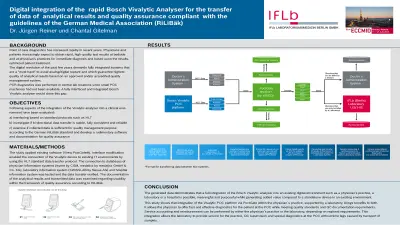Learn more about the study: Optimized patient care through digital integration of the Bosch Vivalytic Analyzer

The Vivalytic Analyzer for optimized patient treatment
Background
Point of care diagnostics has increased rapidly in recent years. Physicians and patients increasingly expect to obtain rapid, high-quality test results at bedside and at physician’s practices for immediate diagnosis and based upon the results, optimized patient treatment. The digital revolution of the past few years demands fully integrated systems that are a “must have” to avoid analog/digital rupture and which guarantee highest quality of analytical results based on an approved and/or accredited quality management system. PCR diagnostics was performed in central lab locations since small POC machinery had not been available. A fully interfaced and integrated Bosch Vivalytic analyser would close this gap.
Objectives
Following aspects of the integration of the Vivalytic analyzer into a clinical environment have been evaluated:
a) interfacing based on standard protocols such as HL7
b) investigate if bi-directional data transfer is stable, fully consistent and reliable
c) examine if collected data is sufficient for quality management purpose according to the German RiLiBäk standard and develop a rudimentary software and documentation for quality assurance
Methods
The study applied existing software (Vireq PoctGate®).
Interface modification enabled the connection of the Vivalytic device to existing IT environments by using the HL7 standard data transfer protocol. The connection to databases of physician information systems (isynet by CGM, medatixx by medatixx GmbH & Co. KG), laboratory information system (SWISSLAB by Nexus AG) and hospital information system was tested and the data transfer verified. The documentation of the analytical results and transmitted data was examined regarding usability within the framework of quality assurance according to RiLiBäk.
Conclusion
The generated data demonstrates that a full integration of the Bosch Vivalytic analyser into an existing digital environment such as a physician’s practice, a laboratory or a hospital is possible, meaningful and purposeful while generating added value compared to a standalone device in an existing environment.
This study shows that integration of the Vivalytic POC platform via PoctGate within the physician´s practice, supported by a laboratory, brings benefits to both. It allows the physician to offer fast and effective diagnostics for the patient at the POC while meeting quality standards and QC documentation requirements. Service accounting and reimbursement can be performed by either the physician’s practice or the laboratory, depending on regional requirements. This integration allows the laboratory to provide service for the practice, QC supervision and special diagnostics at the POC without time lags caused by transport of samples.
